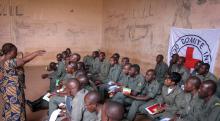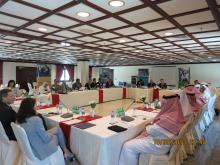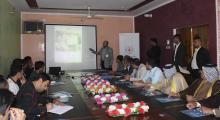Basic international humanitarian law (IHL) rules applicable to this situation:
Each party to the conflict must respect and ensure respect for IHL by its armed forces and other persons or groups acting in fact on its instructions, or under its direction or control.
Each State must make legal advisers available, when necessary, to advise military commanders at the appropriate level on the application of IHL.
States and parties to the conflict must instruct their armed forces in IHL.
The case in brief
Between 1992 and 1995 an ethnically rooted armed conflict erupted in Bosnia and Herzegovina, involving forces loyal to the newly created Bosnian government, supported by Croatia, and Bosnian Serb forces supported by the former Yugoslav armed forces. Conscious of serious abuses of IHL and human rights arising from the fighting, the parties formally agreed to build respect for IHL among their fighting forces.
Hostilities officially ended with the signature of the Dayton Peace Agreement in 1995. At the request of the United Nations, North Atlantic Treaty Organization (NATO) forces deployed to enforce the fragile peace. NATO appointed a network of military lawyers to advise military commanders and train troops, helping ensure consistent interpretation of the Rules of Engagement in compliance with IHL.
IHL compliance highlights
- In May 1992, at the ICRC’s invitation, the Bosnian, Croatian and Serbian parties signed a special agreement devised to address humanitarian problems arising from the conflict. This included a commitment to provide IHL instruction to all fighting units under their command, control or influence, and to promote ICRC appeals urging respect for IHL.
- Upon its deployment in 1995, NATO established a comprehensive legal network to support its various units from command level to ground level. Appropriate legal specialists were available to:
- help draft operational agreements and other documents in accordance with IHL
- work with commanders to develop operational plans and resolve questions relating to rules of engagement prior to operations
- train troops on interpreting and applying the rules of engagement effectively to ensure appropriate use of force.
- To ensure coordination across the multinational force, NATO legal advisors met regularly to resolve emerging issues, ensuring that different units agreed on how to interpret and apply the rules as anticipated incidents unfolded.
Case prepared by Eliza Carmen, Kyle Hunter and Molly Wooldridge, J.D. students at Emory University School of Law, under the supervision of Professor Laurie Blank, Emory University School of Law; with the contribution of Jemma Arman and Isabelle Gallino, LL.M. students at the Geneva Academy.
A. IHL DISSEMINATION AND THE SPECIAL AGREEMENT OF 22 MAY 1992
President of the Republic of Bosnia-Herzegovina
President of the Serbian Democratic Party
President of the Serbian Democratic Party
President of the Party of Democratic Action
President of the Croatian Democratic Community
- conscious of the humanitarian consequences of the hostilities in the region;
- reiterating their commitment to respect and ensure respect for the rules of International Humanitarian Law;
- taking into consideration the Hague Statement of November 5, 1991;
- by providing appropriate instruction on the rules of international humanitarian law to all units under their command, control or political influence;
- by facilitating the dissemination of ICRC appeals urging respect for international humanitarian law;
- by distributing ICRC publications. […]
B. COORDINATION AMONG LEGAL ADVISERS ON RULES OF ENGAGEMENT AND OTHER LEGAL MATTERS
C. THE ROLE OF JUDGE ADVOCATES IN THE WAR IN BOSNIA AND HERZEGOVINA
- Helped craft the GFAP [General Framework Agreement for Peace]
- Assisted commanders at every level - from the coalition level to the base camp in the Zone of Separation - with every aspect of the Rules of Engagement
- Helped negotiate, write, and interpret the crucial Status of Forces Agreements, Transit Agreements, Implementing and Technical Arrangements, and Acquisition and Cross Servicing Agreements […]
- Developed expertise and procedures while participating in critical Joint Military Commission and bi-lateral meetings.
Discussion
2. Did the conflict end with the Dayton Peace Agreement in 1995? What does “general close of military operations” mean? (GC IV, Art. 6; P I, Art. 3)
3. How do you classify the situation after 1995? Was IHL applicable? Was it applicable to the use of force by peacekeeping forces?
5. Is there an obligation for States to include the teaching of IHL in military training? Is this obligation applicable even outside armed conflicts? Who else needs to be trained in IHL? (GC I-IV, Art. 1; GC I-IV, Arts. 47/48/127/144; P I, Art. 6; P I, Art. 82; CIHL, Rule 142)
6. Is there an obligation under IHL to consult legal advisers before launching an attack? Is the advice of the lawyers binding upon the commanders?
7. Is the requirement to have sufficiently competent legal advisers in an armed force part of the fulfilment of the obligation of “ensuring respect” for IHL? Considering document A, how else can the parties to the conflict comply with this obligation in your opinion? (GC I-IV, Art. 1)
8. Which factors, in your opinion, created the need for an organised system of lawyers during the NATO operations? Why is it important that there be coordination among the different NATO lawyers from the various contributing countries?
9. What are the dangers of not having legal counsel at the decision-making level? What would be the risks for the civilian population? For the commanders? For the reputation of the parties? What are the risks of commanders having a legal adviser?
10. Document C mentions the challenge of “how to apply the use of force in peace operations”. Does IHL provide specific rules for such peace operations?
11. Document C refers to “soldier-lawyers”: what is the benefit of having someone trained in the legal field that has also undergone military training?






